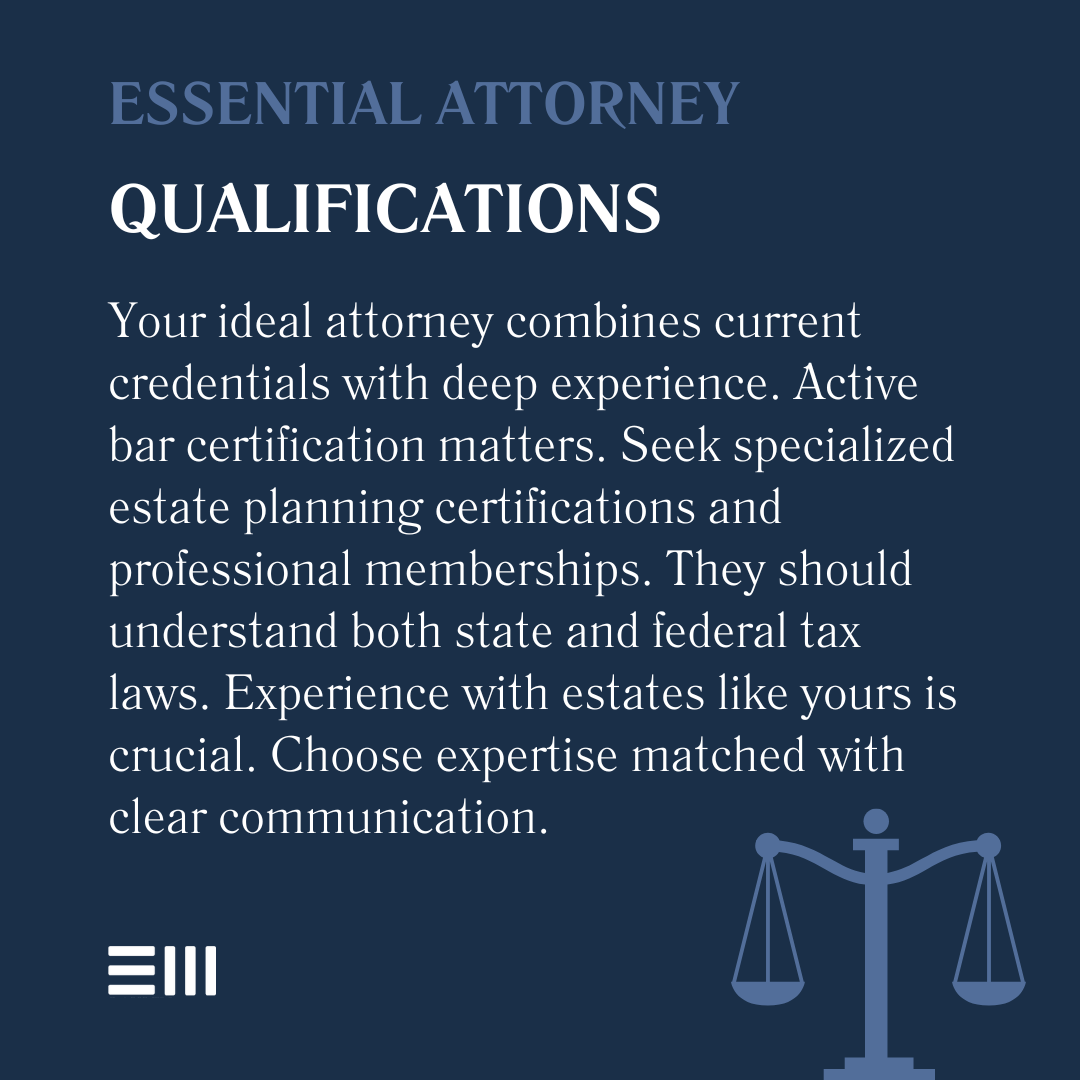Nearly 68% of Americans don't have a will or estate plan, leaving their families vulnerable to lengthy probate processes and potential legal disputes.
Behind every successful legacy lies a carefully crafted estate plan and a skilled attorney who helped shape it.
From preserving generational wealth to protecting vulnerable family members, your choice of an estate planning attorney influences how your life's work will impact those you care about most.
While the decision may feel overwhelming, understanding what to look for in a legal partner can transform this critical choice into a confident step toward securing your family's future.
Understanding Estate Planning Attorneys
Estate planning attorneys specialize in preparing legal documents and strategies that protect your assets and ensure your wishes are carried out after death.
Their expertise spans wills, trusts, power of attorney documents, and healthcare directives. These legal professionals understand the intricate web of state and federal laws that affect how your estate will be handled.
Beyond basic document preparation, estate planning attorneys provide invaluable guidance on tax minimization strategies, asset protection, and business succession planning.
They help clients navigate complex family dynamics and ensure that wealth transfers smoothly across generations while minimizing potential conflicts.
Key Qualifications to Look For
When evaluating potential estate planning attorneys, consider these essential qualifications:
- State bar certification and active license;
- Years of focused estate planning experience;
- Additional certifications in estate planning;
- Membership in professional organizations;
- Regular continuing education participation;
- Experience with estates similar to yours;
- Knowledge of state-specific inheritance laws;
- Understanding of federal estate tax regulations;
- Familiarity with business succession planning; and
- Experience with special needs trusts.
Beyond these basic qualifications, look for attorneys who stay current with changing tax laws and estate planning regulations through ongoing education and professional development.
The best practitioners often hold additional certifications such as Certified Elder Law Attorney (CELA) or Estate Planning Law Specialist (EPLS) credentials.
Professional organization memberships, particularly in the National Association of Estate Planners & Councils (NAEPC) or the American College of Trust and Estate Counsel (ACTEC), indicate a commitment to maintaining high professional standards and staying current with industry best practices.
Questions to Ask During Consultation
Consider asking these important questions during your initial consultation:
- How many years have you focused specifically on estate planning?
- What percentage of your practice is dedicated to estate planning?
- How do you handle estate plan updates and revisions?
- What is your communication policy with clients?
- How do you charge for your services?
- Who will be my primary contact at your firm?
- How often do you recommend reviewing and updating estate plans?
- What is your experience with complex family situations?
- How do you stay current with changing tax laws?
- What is your approach to asset protection?
- How do you handle international assets or properties?
- What is your experience with charitable giving strategies?
The attorney's responses should demonstrate both expertise and a commitment to clear client communication.
Pay attention to how well they explain complex concepts and their willingness to answer questions thoroughly.
Red Flags to Watch For
Be cautious of attorneys who:
- Pressure you to make immediate decisions;
- Refuse to provide references;
- Are vague about their fee structure;
- Lack professional credentials;
- Show limited knowledge of recent tax law changes;
- Have poor client reviews or disciplinary actions;
- Push unnecessary legal services;
- Fail to explain complex terms in understandable language;
- Show disinterest in your specific family situation;
- Have limited experience with estates similar to yours;
- Demonstrate poor communication or responsiveness; and
- Cannot provide clear examples of their work.
These warning signs could indicate potential issues with the attorney's professionalism or expertise. A reputable estate planning attorney should be transparent about their services, fees, and processes.
Steps in the Selection Process
Finding the right estate planning attorney requires a methodical approach to ensure you choose a qualified professional who matches your needs.
- Research potential attorneys through state bar associations;
- Read client reviews and testimonials;
- Schedule consultations with multiple attorneys;
- Compare fee structures and service offerings;
- Check professional credentials and disciplinary history;
- Review sample documents and past work;
- Evaluate communication style and responsiveness;
- Verify professional organization memberships;
- Request and contact references;
- Consider the firm's succession plan;
- Review their technology and security measures; and
- Assess their staff support and resources.
Take time to thoroughly evaluate each potential attorney before making your final decision. Remember that this relationship may span years or decades, so compatibility and trust are essential.
Cost Considerations
Estate planning attorney fees typically range from $1,500 to $5,000 for basic estate plans, with complex estates costing significantly more.
Consider these fee structures:
- Flat fees for specific services;
- Hourly rates for complex planning;
- Package deals for comprehensive estate plans;
- Ongoing maintenance fees for plan updates;
- Additional charges for document modifications;
- Costs for annual reviews and updates;
- Fees for trust administration services; and
- Charges for emergency consultations.
Understanding fee structures helps you budget appropriately and avoid unexpected costs. Be sure to get all fee agreements in writing and understand what services are included in each package or rate.
Many attorneys offer different service tiers to accommodate various budget levels while ensuring essential estate planning needs are met.
Some may also provide payment plans or sliding scale fees based on estate size or complexity.
Frequently Asked Questions About Choosing an Estate Planning Attorney
Estate planning involves many complex decisions.
Here are answers to some of the most common questions we receive about choosing an estate planning attorney in Alabama.
How Often Should I Update My Estate Plan?
Review your estate plan every 3-5 years or after major life changes like marriage, divorce, births, deaths, or significant asset changes.
Regular reviews ensure your plan remains aligned with your goals and current laws.
What Documents Should My Estate Planning Attorney Prepare?
A comprehensive estate plan typically includes a will, living trust, power of attorney, healthcare directive, and beneficiary designations.
Additional documents may include business succession plans, special needs trusts, or charitable giving arrangements.
How Long Does Estate Planning Take?
Most basic estate plans can be completed within 2-4 weeks, while complex estates may take several months to finalize.
The timeline depends on your estate's complexity, your responsiveness with information, and the attorney's current workload.
What Information Should I Prepare Before Meeting an Attorney?
Gather asset documentation, family information, beneficiary preferences, and any existing estate planning documents.
Include details about real estate, investments, business interests, life insurance policies, and retirement accounts.
How Do I Know if My Estate Plan Needs Updating?
Consider updating your estate plan if you experience major life changes, significant asset value changes, or when tax laws affect your estate planning strategy.
Your attorney should help you establish a regular review schedule.
Secure Your Family's Future
Don't leave your family's future to chance. Our experienced Alabama estate planning attorneys are ready to help you create a comprehensive plan that protects your assets and honors your wishes.
With proper planning, you can ensure your legacy continues exactly as you envision.
Contact us today for a confidential consultation and take the first step toward securing your legacy.


